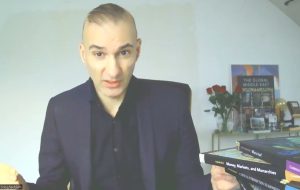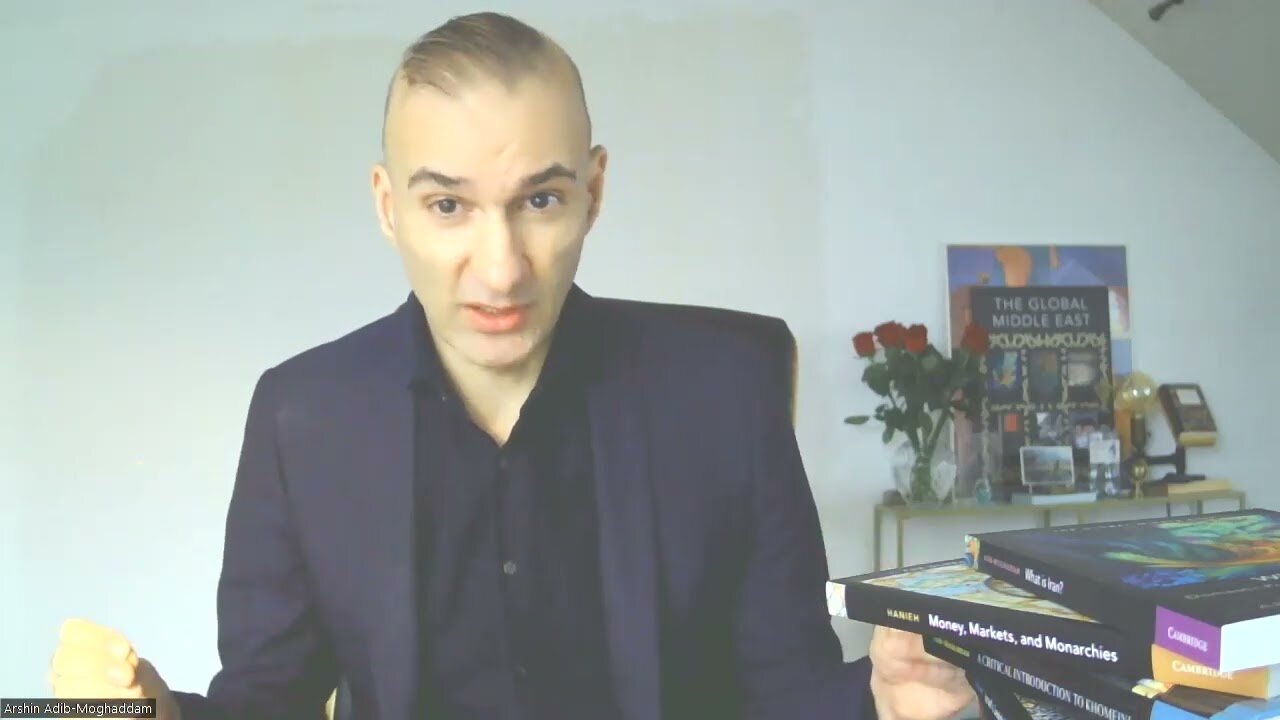Elon Musk driven by hyper-capitalism and techno-imperialism: philosopher
TEHRAN – Arshin Adib-Moghaddam, a professor in global thought and comparative philosophies, says tech billionaire Elon Musk who openly backs “extremist figures” in Europe is “facilitating extremism and misinformation”. Moghaddam has analyzed the ideological tenets driving Musk in his last book on Artificial Intelligence. “One of the central arguments that I make in these studies


TEHRAN – Arshin Adib-Moghaddam, a professor in global thought and comparative philosophies, says tech billionaire Elon Musk who openly backs “extremist figures” in Europe is “facilitating extremism and misinformation”.
Moghaddam has analyzed the ideological tenets driving Musk in his last book on Artificial Intelligence.
“One of the central arguments that I make in these studies is that Musk is driven by an ideological framework reflecting a combination of hyper-capitalism, right-wing political leanings, and techno-imperialism,” the professor from the SOAS University of London tells the Tehran Times in an exclusive interview.
The leading scholar also said the “crimes committed in Palestine will determine the future of international law and human rights all over the world.”
Following is the text of the Interview:
QUESTION: Donald Trump has again threatened to reclaim the Panama Canal and has not ruled out using military force or economic sanctions to pursue acquisition of the Panama Canal and Greenland. What do such threats reveal about Trump’s personality or state of mind? In his January 6 press briefing, Trump also threatened Canada calling the border between the two countries an “artificially drawn line.” His remarks came just a few weeks after he called Canada the 51st U.S. state. What sense does such a covetous eye on Canada send to the world, especially to American friends and allies especially as the Canadian FM said “we will never back down in the face of threats.”?
ANSWER: The threats are meant to be a negotiating tactic, that starts with a maximalist demand to coerce a net-positive outcome. It is largely taken from the business environment that Donald Trump and his regime is steeped in. The problem is of course, that this approach is uneducated, as mundane business approaches that may work in the real-estate sector, can’t be applied to the complexity of world politics. The Trump presidency will hollow out any remaining residues of foreign policy competency from the civil service in the United States. There won’t be a Cyrus Vance or Zbigniew Brzezinski. Rather comparable to authoritarian systems where leading positions are allocated in accordance with allegiance to the regime in power, rather than competence to do the job, Trump is staffing his cabinet with compliant yay-sayers. What emerges is a strategic incompetence that is truly dangerous for the stability of the international system.
Q: Aren’t such threats a blow to international order and disrespect to other countries’ sovereignty or an encouragement toward anarchy?
“Sovereignty is eroded by an overt form of imperial foreign policy,” philosopher says of Trump’s covetous eye on Greenland
A: From a scientific or conceptual perspective, the current international system is anarchic in any case, as there is no organisation that could mitigate conflict. Trump exacerbates this trend, as war becomes an ever-more present prospect in the conduct of international affairs. Sovereignty is the first casualty within such a system. The best prophylaxis against becoming the prey of predators in such a system is to a) maximise the legitimacy of the state through democratic accountability and respect for human rights to minimise the gap between state and society which would be exploited from the outside and b) a robust international diplomacy to complement that domestic legitimacy of the state with an international strategy. Again: In an anarchic system where sovereignty is eroded by an overt form of imperial foreign policy, as Trump clearly stands for, the first line of defense to ensure stability is legitimacy, engineered by implementing democratic acceptance of the government by the population and international recognition as a stable, peaceful and accountable actor. There is no military solution to the dilemma of legitimacy. In fact, militarised, authoritarian policies are the biggest threat to national security. In the Iranian context, this requires a swift and sustained institutionalisation of “mardom-salari,” as a central strategy to shift the crux of governance from a national security approach to a human security emphasis. In a world where we are more connected than ever, peaceful diplomacy and more democracy is not a luxury, but a necessity for survival.
Q: Isn’t Trump’s U.S. emerging as a bully that would threaten the Western alliance and even NATO? For years American officials have been floating the idea that the U.S. is the leader of the “free world”, however, such remarks show that the U.S., at least under Trump, is emerging as a bully in the world. Please give your own opinion. Can Trump’s threats force Western allies to reassess their policies or take a departure from the U.S. in terms of defense and economy in the long run? Also, don’t you think that Trump’s remarks embolden powerful countries to frighten others?
A: The so-called “West” has been fractured along social, cultural and political lines for a long while, now. There is still a powerful elite consensus that keeps the idea together, and NATO is the main factor. However, the reality is that even in the United States and certainly in Europe, inevitable demographic changes also because of irreversible immigration patterns, will alter the political and socio-economic landscape forever. This is why the resurgent right-wing in Europe, Trump himself and Elon Musk are bandwagoning, to ward off this movement towards increasing social and multicultural hybridity. Theirs is an effort to keep the social status quo from being altered, to keep the elites in power without impingement from the “brown people” or collaborating “leftists”. It is those social trends that will determine the future of the “West”. Trump and the European right-wing know this, which is why they want to fortify their privileges. But the push from below, from immensely resourceful civil societies are already recalibrating the political landscape. Trump may well be a transitory moment in this trend. The future of the United States will be co-determined by the current minorities as the Latino and African-American population is set to constitute the majority in the country in a couple of decades and for the first time in history. When I speak to Chinese, South American or other intellectuals and strategists from the non-Western world, they are aware of such social factors when they think about international politics. In Iran, too, such demographic and social trends need to be integrated into a science of international politics.
Q: Trump also repeated his threat that “all hell will break out in the Middle East” if Hamas does not release hostages by the time he takes office. What else remains that Trump’s administration can do against Gaza as the enclave is already a hell?
A: The horrors of Gaza can only be fathomed by the Palestinians, while it must be showcased as a historical crime by any concerned individual in the world. In essence, this battle to showcase the crimes committed in Palestine will determine the future of international law and human rights all over the world. If it is accepted that the Benjamin Netanyahu administration plunges the whole international system into a sick denial of the crimes committed on a daily basis, we are all doomed, as our own human security will be a target. So the battle goes far beyond the issue of Trump. Palestine today is a battleground that will constitute the future of human rights and international law. I should say that I am in no doubt that History will judge Netanyahu and the Israeli state with the full force of scholarly rigour. You can’t murder yourself to legitimacy and geopolitical success. As for the proclamation of Trump: It is that zero-sum negotiating tactic that I mentioned, which does not leave much room for diplomacy or educated discourse.
Q: Elon Musk, a close aide to Trump, is also using offensive language against European leaders including the German chancellor and president. Please give your own opinion as a philosopher.
Musk and Trump are where they are because of money and not because of their competence in terms of politics.
A: This question relates to some of the issues that I have researched in two studies on Artificial Intelligence: “Is Artificial Intelligence Racist? The ethics of AI and the future of Humanity” (Bloomsbury 2023), and the forthcoming “The myth of good AI: Manifesto for Critical AI studies” (Manchester University Press, 2025). The latter book has several sections on Muskism, the ideological tenets driving Elon Musk. One of the central arguments that I make in these studies is that Musk is driven by an ideological framework reflecting a combination of hyper-capitalism, right-wing political leanings, and techno-imperialism. His focus on profit maximization often aligns with controversial stances, such as his support for extremist figures. Furthermore, Musk’s management of his social media platform, X, has been rightly criticized for amplifying harmful content under the guise of promoting “free speech,” facilitating extremism and misinformation. Muskism, thus, reflects an ethos that reinforces power hierarchies, promotes technological determinism, and neglects the complexities of social justice and cultural empathy. Politically, Muskism stands in opposition to agendas of social equity, inclusion and multiculturalism. In addition, Muskism displays an insidious suspicion towards the Humanities and Social Sciences. As such, it can be treated as an ideological system that is essentially anti-cultural and incredibly uneducated on social and political matters. After all, both Musk and Trump are where they are because of money and not because of their competence in terms of politics. Their claim to power has been possible because US democracy has been increasingly superseded and undermined by a particularly extremist form of hyper-capitalism with all of its very visible, authoritarian and illiberal manifestations.
